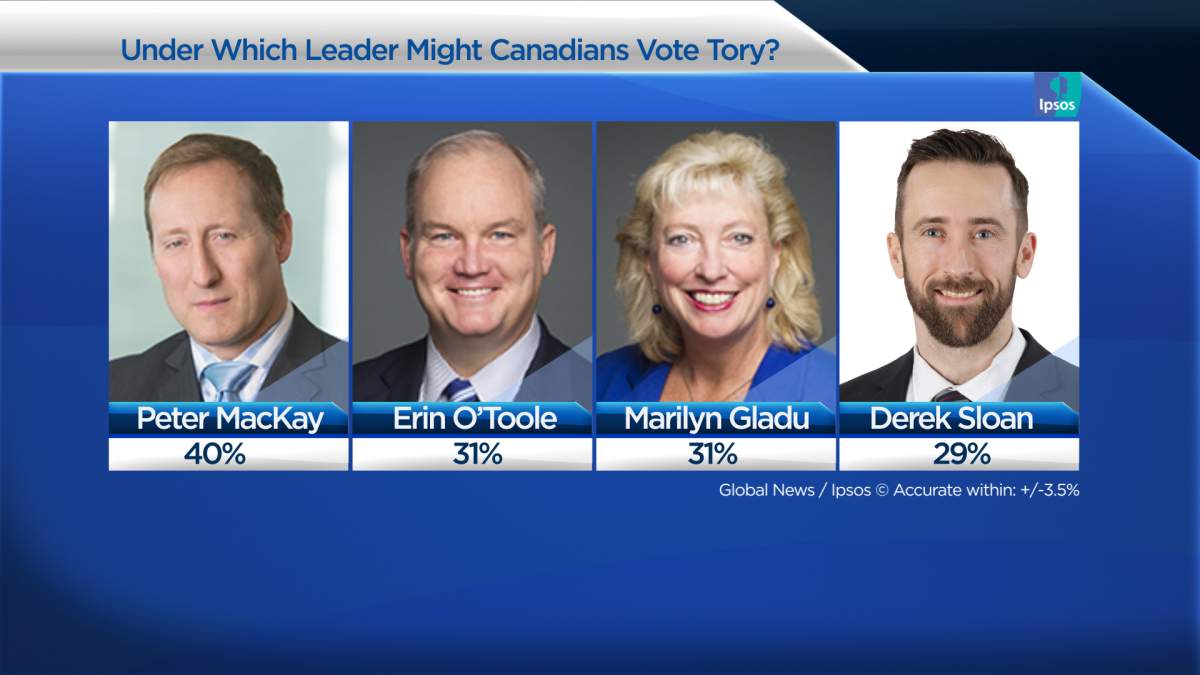Leadership candidate Peter MacKay might just be the Conservatives’ best chance at getting more Canadians to vote for the party.

That’s according to a new Ipsos poll, conducted exclusively for Global News, that asked Canadians about their views and recognition of four candidates in the Conservative leadership race — MacKay, Erin O’Toole, Marilyn Gladu and Derek Sloan.
Ipsos asked 1,000 Canadians — both Conservative voters and those who say they vote for other parties — under whose leadership they would consider voting for the Tories in the next election. A total of 40 per cent pointed to MacKay, compared to 31 per cent for both O’Toole and Gladu.
Just 29 per cent said they would be open to voting Conservative if the party was led by social conservative Sloan, who was just elected in the fall.
“You can really see that Peter MacKay is benefiting from his level of visibility as a cabinet minister over many years, because when you ask both Conservative voters and even Canadians generally, obviously his awareness is pretty far ahead,” said Darrell Bricker, CEO of Ipsos, in an interview with Global News.
“Awareness at this stage really does lead to support not just among Canadians generally, but also among people who say they would vote Conservative in the next election.”

Conservative Leader Andrew Scheer lost the election to Prime Minister Justin Trudeau last fall.

Get breaking National news
While the Conservatives under Scheer won the popular vote and swept Alberta and Saskatchewan, they failed to win much-needed seats in the Greater Toronto Area and Quebec, which traditionally determine which party will form government.
Critics from within his own party, including some who worked on his campaign, pointed the finger at Scheer’s social conservative views, including his opposition to same-sex marriage and reproductive rights.
Following that loss, Scheer said in December that he would step down as Conservative leader once the party picked a replacement.
That leadership race is now underway, with voting scheduled for June 27.
But the race has been notable for the number of high-profile candidates who have chosen not to run: big names like Rona Ambrose, Jean Charest, Pierre Poilievre, Candice Bergen and Michael Chong.

Bricker said the big question for Conservatives now will be looking at which candidate has the name recognition to swing voters in key regions like the Greater Toronto Area. On that front, he said, it could be MacKay who has the advantage.
Thirty-one per cent of Liberal voters said they would consider voting for him compared to 22 per cent for O’Toole.
Twenty-seven per cent of NDP voters and 22 per cent of Bloc Quebecois voters said the same.
In contrast, just 17 per cent of NDP voters and 12 per cent of Bloc voters said they would consider voting for O’Toole.
- Tumbler Ridge B.C. mass shooting: What we know about the victims
- ‘We now have to figure out how to live life without her’: Mother of Tumbler Ridge shooting victim speaks
- Trump slams Canada as U.S. House passes symbolic vote to end tariffs
- Oysters from Stellar Bay Shellfish brand recalled for norovirus risk
Gladu and Sloan did even less well: 22 per cent of Liberals said they would consider voting for Gladu and 19 per cent said the same for Sloan.
Among the NDP and the Bloc, 16 per cent and 14 per cent, respectively, said they were open to voting for Gladu.
Those dropped to 13 per cent and 12 per cent for Sloan.
All of that, Bricker suggested, will prompt questions for Conservative voters as they weigh the options before them.
“That’s going to be the challenge for the next leader of the Conservative Party.”
This Ipsos poll was conducted between January 24th and 27th, 2020, on behalf of Global News. For this survey, a sample of 1,000 Canadians over the age of 18 was interviewed online. Quotas and weighting were employed to ensure that the sample’s composition reflects that of the Canadian population according to census parameters. The precision of Ipsos online polls is measured using a credibility interval. In this case, the poll is accurate to within ± 3.5 percentage points, 19 times out of 20, had all Canadians over the age of 18 been polled. The credibility interval will be wider among subsets of the population. All sample surveys and polls may be subject to other sources of error, including, but not limited to coverage error, and measurement error.









Comments
Want to discuss? Please read our Commenting Policy first.